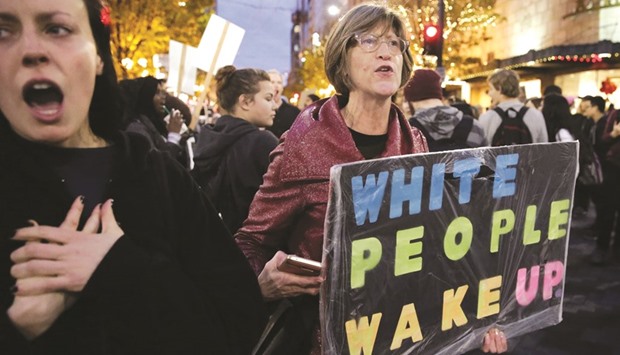Japan’s Prime Minister, Shinzo Abe, will seek reassurances about the US’s commitment to his country’s security when he becomes the first foreign leader to meet Donald Trump today.
Japan and South Korea were rattled by comments the president-elect made during his campaign, when he hinted at a withdrawal of American troops from the Asia-Pacific unless the two US allies paid more towards the cost of their security.
Officials in Tokyo and Seoul were also disturbed by Trump’s suggestion – which he has since denied – that the two countries could end decades of dependence on their US nuclear umbrella and develop their own nuclear deterrents.
Either move would redraw the Asia-Pacific security map and usher in a new era of instability, according to a recent report by the Asia Foundation.
The report warns that the withdrawal of US forces, and the subsequent pressure on Japan and South Korea to go nuclear, would “trigger massive destabilisation of the regional order”. It adds: “A precipitous reduction of engagement in Asia would be detrimental to the interests of most Asian countries as well as the United States.”
In his congratulatory message last Tuesday, Abe reminded Trump of the importance of the Japan-US security alliance to peace and stability in the region.
His message was more fulsome than most, citing Trump’s
“extraordinary talents” as a businessman, and adding: “I very much look forward to closely cooperating with you to further strengthen the bond of the Japan-US alliance.”
Abe will be looking for evidence of Trump’s commitment to bilateral security ties when he meets him in New York today on his way to the Asia Pacific Economic Co-operation (Apec) summit in Peru.
“As it will be their first direct meeting, the talks will focus on building a relationship of personal trust,” Japan’s top spokesman,
Yoshihide Suga, told reporters yesterday. “Their relationship has got off to a great start. They held telephone talks at an extremely early time, shortly after [Trump] was elected.”
In the days since his election victory, Trump has shown signs of shifting away from hardline comments made during his campaign, in which he said Tokyo did not contribute enough to the security offered by the 47,000 US troops based on Japanese soil.
Japan pays nearly 200bn yen (£1.5bn) annually in host-nation support, a sum the country’s defence minister, Tomomi Inada, described as enough”. In a telephone call last week, Trump told Abe that he wanted to strengthen the “special partnership” between Japan and the US.
He struck a similar tone in a brief conversation with the embattled South Korean president, Park Geun-hye, telling her that he would retain existing security arrangements, which include the presence of 28,500 US troops south of the heavily armed border dividing the Korean peninsula.
But Jeffrey Kingston, the director of Asian studies at Temple University in Tokyo, said anxiety remained high in Tokyo following Trump’s “decidedly unreassuring” comments on security.
“Abe will politely try to explain why the alliance is so important and that Trump needs to retreat from some of his assertive rhetoric,” Kingston told Reuters.
US state department officials moved quickly to reassure Japan that the bilateral relationship would remain at the heart of Washington’s policy towards the Asia-Pacific, where Chinese military activity in the South China Sea and North Korea ‘s nuclear weapons programme have significantly raised tensions.
“My message would be one of reassurance to the Japanese people that that relationship is of … core foreign policy interest to the United States,” Mark Toner, the department’s spokesman, told reporters when asked how ties might change under a Trump administration. “That relationship is going to remain, regardless of the administration, a cornerstone for the United States.”
Japan will have to wait for Trump to take office before it can fully gauge how serious he is about maintaining the current security arrangements, according to Tetsuya Otsuru, a senior foreign ministry official.
“Trump may take longer than usual to build his administration as he searches for people to fill key policy positions,” Otsuru said in a speech in Tokyo. “We want to safeguard our alliance with the United States during the transition.”
Abe could receive disappointing news on trade, having invested considerable political capital at home with his support for the Trans-Pacific Partnership (TPP) free trade pact, now abandoned by the Obama administration.
Many observers believe that Trump’s protectionist, “America first” stance – one he is unlikely to revise – has in effect brought the 12-nation trade pact to its knees.
On Monday, Trump’s advisers, Peter Navarro and Alexander Gray, said in a newspaper op-ed piece that he would “never again sacrifice the US economy on the altar of foreign policy by entering into bad trade deals like the North American Free Trade Agreement, allowing China into the World Trade Organisation, and passing the proposed TPP”. Whatever disagreements they have about trade and security, Trump and Abe will find it easier to establish common ground when it comes to dealing with Vladimir Putin.
Trump has made no secret of his admiration for the Russian leader, while Abe has been pushing for closer ties with Russia in the run-up to Putin’s visit to Tokyo next month.
Russia is seeking more Japanese investment in its underdeveloped far east region, while Japan is hoping to resolve a long-running dispute over ownership of the Kuril islands – known in Japan as the Northern Territories – four islands that belonged to Japan until they were invaded by Soviet forces at the end of the second world war.

People march against Donald Trump in Seattle, Washington.
